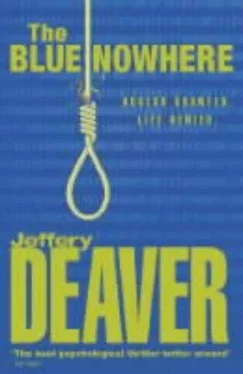The cop shook his head with a bitter laugh. "Shawn was a computer? Jesus, somebody oughta throw every fucking one of 'em into the ocean."
"Why do you keep saying that?" Gillette snapped. "I'm getting a little tired of it."
"Of what?" Shelton shot back.
No longer able to control his anger at the cop's harsh treatment of him over the past few days, the hacker muttered, "You've been dumping on me and machines every chance you get. But it's a little hard to believe coming from somebody with a thousand-dollar Winchester drive sitting in his house."
"A what?"
"When we were over at your house I saw that server drive sitting in your living room."
The cop's eyes flared. "That was my son's," he growled. "I was throwing it out. I was finally cleaning out his room, getting rid of all that computer shit he had. My wife didn't want me to throw out any of his things. That's what we were fighting about."
"He was into computers, your son?" Gillette asked, recalling that the boy had died several years ago.
Another bitter laugh. "Oh, yeah, he was into computers. He'd spend hours online. All he wanted to do was hack. Only some cybergang found out he was a cop's kid and thought he was trying to snitch ' em out. They went after him. Posted all kinds of shit about him on the Internet -that he was gay, that he had a record, that he molested little kids… They broke into his school's computer and made it look like he changed his own grades. That got him suspended. Then they sent some girl he'd been dating this filthy e-mail in his name. She broke up with him because of it. The day that happened he got drunk and drove into a freeway abutment. Maybe it was an accident – maybe he killed himself. Either way it was computers that killed him."
"I'm sorry," Gillette said softly.
"The fuck you are." Shelton stepped closer to the hacker, his anger undiminished. "That's why I volunteered for this case. I thought the perp might be one of the kids in that gang. And that's why I went online that day – to see if you were one of 'em too."
"No, I wasn't. I wouldn't've done something like that to anybody. That's not why I hacked."
"Oh, you keep saying that. But you're as bad as any of them, making my boy believe that those goddamn plastic boxes're the whole world. Well, that's bullshit. That's not where life is." He grabbed Gillette's jacket. The hacker didn't resist, just stared at the enraged man's face. Shelton snapped, "Life is here! Flesh and blood… human beings… Your family, your children…" His voice choked, tears filled his eyes. " That's what's real."
Shelton shoved the hacker back, wiped his eyes with his hands. Bishop stepped forward and touched his arm. But Shelton pulled away and disappeared into the crowd of police and agents.
Gillette's heart went out to the poor man but he couldn't help but think: Machines're real too, Shelton. They're becoming more and more a part of that flesh-and-blood life every day and that's never going to change. The question we have to ask ourselves isn't whether this transformation is in itself good or bad but simply this: Who do we become when we step through the monitor into the Blue Nowhere?
The detective and the hacker, alone now, stood facing each other. Bishop noticed his shirt was untucked. He shoved the tail into his slacks then nodded at the palm tree tattoo on Gillette's forearm. "You might want to get that removed, you know. I don't think it does a lot for you. The pigeon at least. The tree's not too bad."
"It's a seagull," the hacker replied. "But now that you bring it up, Frank… why don't you get one?"
"What?"
"A tattoo."
The detective started to say something then lifted an eyebrow. "You know, maybe I just will."
Then Gillette felt his arms being gripped from behind. The state troopers had arrived, right on schedule, to return him to San Ho.
CHAPTER 00101111 / FORTY-SEVEN
Aweek after the hacker returned to prison Frank Bishop made good on Andy Anderson's promise and, over the warden's renewed objections, delivered to Wyatt Gillette a battered, secondhand Toshiba laptop computer.
When he booted it up the first thing he saw was a digitized picture of a fat, dark-complected baby, a few days old. The caption beneath it read "Greetings – from Linda Sanchez and her new granddaughter, Maria Andie Harmon." Gillette made a mental note to send her a letter of congratulations; a baby present would have to wait, federal prisons not having gift shops as such.
There was no modem included with the computer of course. Gillette could have gone online simply by building a modem out of Devon Franklin's Walkman (bartered to Gillette for some apricot preserves) but he chose not to. It was part of his deal with Bishop. Besides, all he wanted now was for the last year of his sentence to roll by and to get on with his life.
Which isn't to say that he was completely quarantined from the Net. He'd been allowed onto the library's dog-slow IBM PC to help with the analysis of Shawn, whose new foster home was Stanford University. Gillette was working with the school's computer scientists and with Tony Mott. (Frank Bishop had emphatically denied Mott's request to be transferred to Homicide and had placated the young cop by recommending that he be named acting head of the Computer Crimes Unit, which Sacramento agreed to.)
What Gillette had found within Shawn had astonished him. To give Phate access to as many computers as possible, via Trapdoor, he'd endowed his creation with its own operating system. It was unique, incorporating all existing operating systems: Windows, MS-DOS, Apple, Unix, Linux, VMS and a number of obscure systems for scientific and engineering applications. His operating system, which he called Protean 1.1, reminded Gillette of the elusive unified theory that explains the behavior of all matter and energy in the universe.
Only Phate, unlike Einstein and his progeny, had apparently succeeded in his quest.
One thing that Shawn didn't disgorge was the source code to Trapdoor or the location of any sites where it might be hidden. The woman calling herself Patricia Nolan had, it seemed, been successful in isolating and stealing the code and destroying all other copies.
She hadn't been found either.
It used to be easy to disappear because there were no computers to trace you, Gillette had told Bishop when learning this news. Now, it was easy to disappear because computers can erase all the traces of your old identity and create brand-new ones.
Bishop reported that Stephen Miller had been given a full-dress policeman's funeral. Linda Sanchez and Tony Mott were still apparently troubled that they'd believed Miller was the traitor when in fact he was only a sad holdout from the elder days of computing, a has-been on a futile search for the Next Big Thing in Silicon Valley. Wyatt Gillette could have told the cops, though, that they needn't have felt any guilt; the Blue Nowhere tolerates deceit far more than it does incompetence.
The hacker had been given further dispensation to go online for another mission. To look into the charges against David Chambers, the suspended head of the Department of Defense's Criminal Investigation Division. Frank Bishop, Captain Bernstein and the U.S. attorney had concluded that the man's personal and business computers had been hacked by Phate to get Chambers removed and to have Kenyon or one of his lackeys appointed as his replacement to get Gillette off the case
It took the hacker only fifteen minutes to find and download proof that, indeed, the man's files had been cracked and brokerage trades and off-shore accounts had been faked by Phate. The charges against him were dropped and he was reinstated.
No charges were ever brought against Wyatt Gillette for his Standard 12 hack or against Frank Bishop for helping Gillette escape from the CCU. The U.S. attorney decided to drop the investigation – not because he believed the story that it had been Phate who'd hacked together the cracking program that busted Standard 12, but because of a Department of Defense audit committee investigation looking into why $35 million had been spent on an encryption program that was essentially unsecure.
Читать дальше












